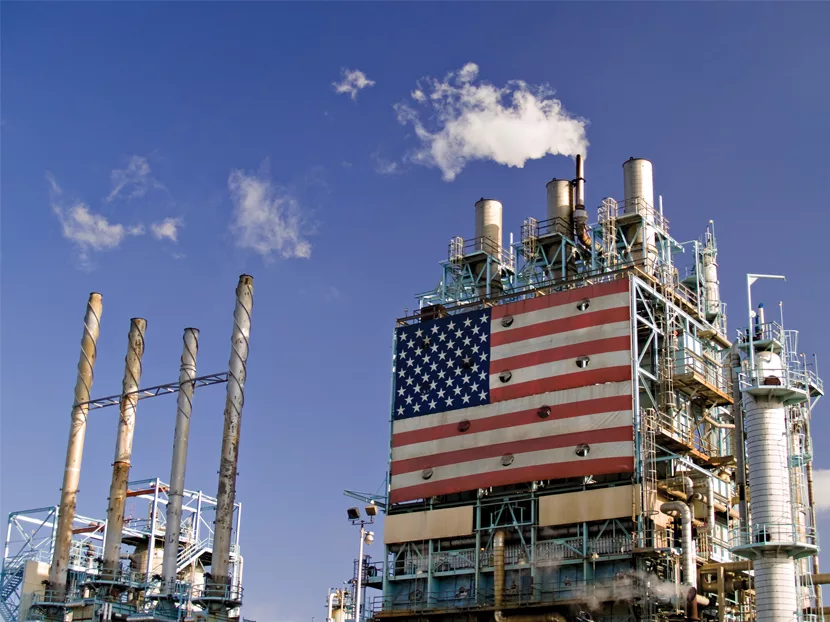The construction markets are entering the late stage of the recovery cycle; however, experts do not predict an impending downturn in the United States. The market is supported in part by increases in public spending, according to the economic forecasts analyzed by Engineering News-Record.
“We’re not expecting a recession in 2020,” expresses Richard Branch, chief economist at Dodge Data & Analytics, adding that despite a slowdown, the economy is “in decent shape.”
Dodge Data & Analytics forecasts a 4 percent decline in total construction starts in 2020 compared with 2019. FMI Corp. predicts a 2.4 percent increase in total construction put-in-place in 2020 over 2019. PCA projects total construction put-in-place in 2020 to increase by 1.1 percent over 2019.
Construction starts in the industrial sector for 2020 is projected to remain relatively steady as compared to 2019. Dodge Data & Analytics projects a 1.7 percent decline from 2019; FMI projects an increase of 2.5 percent over 2019; and PCA projects a 0.4 percent decline from 2019.
“There’s still a lot of good in the industry and broader economy that suggests we could continue a path of decent growth over the next several years,” notes Jay Bowman, principal FMI Corp.
The continuing skilled labor shortage will be a significant challenge to deal with in the construction industry during 2020.
With that said, the PVF sector in 2020 looks like it will be reasonably robust, although not a record-breaker.
Refinery Maintenance Projects
U.S. refiners are preparing for major maintenance projects valued in excess of $1.1 billion during the first quarter of 2020. As usual, the Texas coast accounts for some of the highest-valued projects. These include significant projects at two of the largest refineries in the region.
Motiva Enterprises’ refinery in Port Arthur, Texas, is preparing for a major turnaround on a fluid catalytic cracking unit (FCCU) and sulfuric acid alkylation (SF alky) units estimated at $55 million. ExxonMobil Corp.’s refinery in Baytown, Texas, is preparing for an estimated $50 million turnaround on its FCCU No. 3.
Derek U.S. Holdings, a subsidiary of Derek Group (Israel), also is preparing for a major turnaround on its FCCU and SF alky units at its refinery in Big Spring, Texas, valued at $40 million. And Marathon Petroleum Corp. is preparing for a significant turnaround on FCCU and SF alky units at its refinery in El Paso, Texas, valued at $40 million.
In Louisiana, Phillips 66 has two first-quarter turnarounds planned its Alliance Refinery in Belle Chasse, La.; one on its FCCU and SF alky units and one on its crude and vacuum units, each valued at $25 million.
Two other refineries located in Louisiana also are preparing for major turnarounds in the first quarter — Valero Energy Corp.’s Saint Charles Refinery in Norco, La., and Marathon’s refinery in Garyville, La. Valero’s Saint Charles Refinery will undergo an estimated $25 million turnaround in its FCCU and SF alky units. And Marathon’s Garyville refinery will undergo a turnaround on a gas hydrocracker unit valued at $25 million.
Outside of the gulf coast, CVR Energy Inc. is preparing for a first-quarter turnaround on the FCCU at its Coffeyville, Kan., location, valued at $32 million. In addition, PBF Energy Inc.’s Toledo refinery in Oregon, Ohio, is preparing for a turnaround on FCCU and SF alky units valued at $25 million.
Texas Energy Projects
Texas is still the epicenter of energy and related projects, with $18 billion worth of planned projects in the greater Houston area. The chemical process industry is projecting $7 billion in planned kickoffs in 2020. These include the addition of a world-class methylene diphenyl diisocyanate unit at Covestro AG’s Baytown industrial chemicals site.
Nearly $5.8 billion in oil and gas production projects also are planned for 2020 kickoffs. Freeport LNG intends to begin construction on Train IV of its Quintana Island development. Additionally, $2.8 billion combined valued oil and gas pipeline projects are planned to start construction in 2020 in the greater Houston area.
Next Wave Energy Partners has made a final investment decision to construct a new alkylate production facility (Project Traveler), located adjacent to the Houston Ship Channel on its 53-acre site in Pasadena, Texas. The total investment value (TIV) has not been announced.
Great Lakes, Mid-Atlantic Regions
In another region outside the Gulf Coast, the Great Lakes Region — consisting of Illinois, Indiana, Michigan, Ohio and Wisconsin — is looking at more than $12.3 billion in new industrial manufacturing construction starts in the first quarter of 2020. Illinois leads with approximately $9 billion (TIV) in planned kickoffs during the first quarter.
Data centers represent a large portion of the region’s first-quarter construction starts. Amazon will begin construction in New Albany, Ohio, on Phase III of an existing data center, adding a 157,000-square-foot building with equipment and systems to provide expanded cloud data services with a TIV of $300 million.
In Grand Rapids, Mich., Switch SUPERNAP is starting construction on a Phase III expansion of its data center. This is part of a $5 billion overall project that includes a new 382,000-square-foot data center with 100 megawatts of power.
The pharmaceutical-bio industry is another player in the region. Pfizer is planning to add a $450 million modular aseptic processing facility at its Kalamazoo, Mich., manufacturing site. Also, Hovione, a contract manufacturer, is constructing a $232 million grassroot plant to produce active pharmaceutical ingredients to the North American market as well as exports.
The Mid-Atlantic region — consisting of Maryland, North Carolina, Virginia and West Virginia — is looking at $4.4 billion in first-quarter start-ups planned for the industrial manufacturing sector. Virginia is leading the region with more than $3 billion in planned TIV start-ups scheduled for the first quarter.
Scrutinize Critical Materials
In May 2017, a dispute began when plaintiffs Weldbend Corp. and Boltex Mfg. Co. alleged that Ulma falsely advertised its carbon steel flanges as heat-treated (normalized) in accordance with ASTM A105N specifications when they were not.
On Sept. 27, 2019, after a nine-day trial in the U.S. District Court in Houston, the jury handed a win to Weldbend and Boltex.
As a result, I urge the PVF industry to increase the scrutiny of the manufacturers supplying critical materials to their facilities. This applies to the end-user, the distributor and the fabricator to ensure the quality of the product, the safety of the American public and to limit your exposure to significant liability claims.
PVF Roundtable News
These are just an overview of the activities commencing during the first quarter. As a member of the PVF Roundtable board of directors, I urge you to plan to attend the next scheduled networking meeting to be further informed on what the first quarter holds for the PVF industry.
The next meeting of the PVF Roundtable is scheduled for Feb. 11, 2020, and will be held at Houston’s The Bell Tower on 34th, 713-868-2355.
It is the first meeting of the 2020 season and will be a networking meeting beginning at 4:15 p.m. and ending at 8 p.m.
All the members of the PVF Roundtable board urge you and your associates to attend the networking meetings, as this is where the movers and decision-makers from all sectors of the PVF industry meet to network and exchange information and ideas.






